The Masonic Lodge: World’s Smallest Naval Base?
I recently stumbled upon an interesting bit of trivia in an old Wake County Schools publication. It was noted that Raleigh is home to the world’s smallest naval base, located on the grounds of the Josephus Daniels House. Daniels is one of Raleigh’s most notable historical figures: Secretary of the Navy, ambassador to Mexico, and editor of the News & Observer (as well as various smalltown newspapers).
When Daniels moved into his Hayes-Barton home at the end of his appointment as Secretary of the Navy, he wished to have a naval gun mounted on his front lawn. The article stated that the only way this could happen was for the small patch of earth around the gun to be declared an official Navy base.
But before we explore this claim, let’s take a look at the man for whom the house is named.
Humble Roots
The son of a shipbuilder for the Confederate Army who was killed in a Union ambush during the Civil War, Josephus Daniels grew up to a single mother in rural North Carolina. Having an interest in journalism from a young age, by age 18 Daniels was a local news editor for a rural weekly, the Wilson Advocate. By 1894 at the age of 32, he had purchased the News & Observer and turned it in to a powerful voice for the Democratic Party. Despite championing progressive issues such as women’s suffrage, strong antitrust laws and more government oversight, he was a part of the white supremacy movement of the time, and supported Jim Crow laws which enforced racial segregation.
Daniels was a very divisive figure. By one account, he was the most controversial figure in President Wilson’s cabinet. A teetotaler, as Navy Secretary he instituted measures which forbade alcohol on naval vessels. The term ‘cup of joe’ was used by seamen to describe the strongest drink available on ships — coffee. Although folklore sometimes indicates he was the source of this common term, the phrase actually predates that decree.
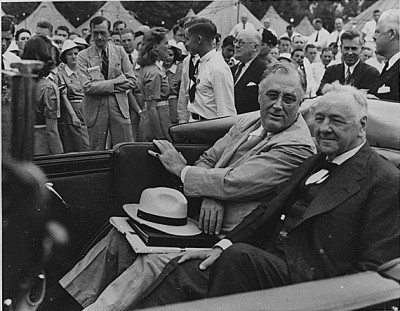
 Franklin Roosevelt and Josephus Daniels in 1940. Image courtesy Franklin D. Roosevelt Presidential Library
Woodrow Wilson named him Secretary of the Navy in 1913, a post which he held for 8 years. Despite his polarizing reputation, he was widely regarded as an effective cabinet official. The U.S. Navy was in good standing at its entry to World War I in 1917, due in no small part to his oversight.
In 1933, President Roosevelt appointed him to be ambassador to Mexico. He further developed relations with our neighbors to the south, which eventually secured loyalty during America’s entry in to World War II.
Daniels returned to Raleigh and to his post at the News & Observer in 1941, due to his wife’s failing health. He died of pneumonia a few years later.
The House
According to City of Raleigh zoning minutes, “It is one of only three sites in the City of Raleigh to hold all three possible historic preservation designations – Local Historic Landmark, Individually Listed National Register Member, and National Historic Landmark”.
Located in the Hayes-Barton neighborhood just outside of downtown, construction began in 1920 when Daniels was still Secretary of the Navy. His wife named it Wakestone, likely due to the Wake County quarried stone used. Built in the Georgian Revival style, it features a prominent two story columned portico.
Transition to Masonic Temple
In 1950, his estate was sold to the Raleigh Freemasons who were then expanding and outgrowing their location on Fayetteville Street.
The Freemasons in North Carolina date to the late 1700s, when the Grand Lodge of North Carolina was one of the first in the new world to be chartered by England. The Daniels House is home to four area lodges.
The interior of the lodge has 3 paintings of one of the most prominent American Freemasons, George Washington.
There are two phrases which every member sees upon entry and exit. The first is “What man is a man who does not try to make the world a better place”.
And the other reads “Men’s hearts ought not to be set against one another, but set with one another, and all against evil only”.
Although the Daniels house has been modified under ownership of the Freemasons, many of the modifications were done with respect to its original style and building materials.
Now, 60 years after relocating from Downtown Raleigh to the Five Points area, another move is in long term plans. The historic property is currently for sale. The space is too large for the needs of the lodges that meet there now.
The Gun Pointed at the Helms Residence
One of Raleigh’s Lodge #500’s most prominent members was the late Jesse Helms. Not only was he a Freemason, but his house was across the street from the lodge — in the direct line of sight of this decommissioned WWI battleship deck gun captured from a German ship.
According to legend, he was very unhappy with the gun. He wasn’t alone, though. As a rule, Freemasons believe in peace and brotherhood and not violence. Having a gun from a battleship on the grounds was somewhat antithetical to what they represent. One member likened it to “that crazy uncle in the attic”. Always there, but hoping that people don’t really notice.
Raleigh: Home of the World’s Smallest Naval Base?
Attempts to find a second published and referenced source for Raleigh’s claim of “World’s Smallest Naval Base” have not been fruitful thus far. However, I was fortunate enough not only to get a tour of the lodge by the kind fellows of Lodge #500, but spoke with a few members who verified the claims.
One member who married in to the Daniels family, stated unequivocally that it was indeed still U.S. Government property, and that they didn’t have the authority to remove the cannon.
Another member noted that they have attempted to contact the Department of the Navy to gain permission to remove it. The response was that the Navy was inclined to respect the original wishes of the Daniels family and have the gun remain intact on the property. According to the original source, the designation of ‘naval base’ extends only to the block base of the gun. As such, it represents a microscopic patch of land to have official Federal status. The historical marker notes only the house, not the gun.
It appears that the gun is still property of the U.S. Government, but it’s less likely that it is currently designated as U.S. Naval Base.
According to the Raleigh City Museum, it is one of three naval guns in the city.

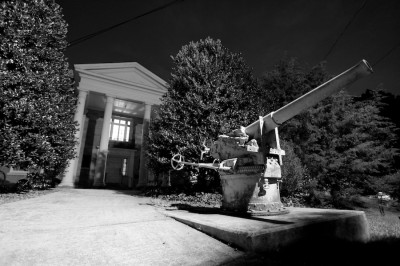
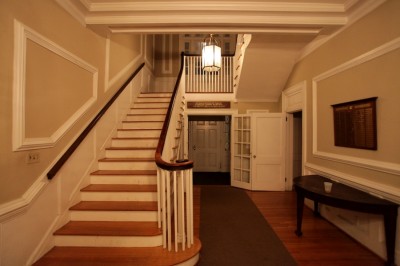
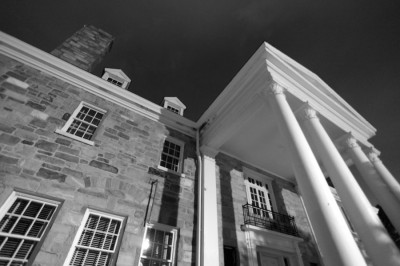
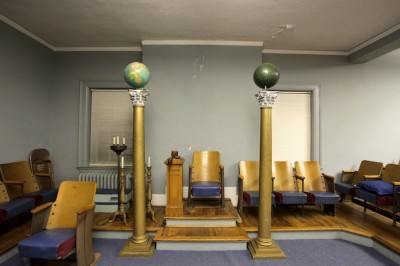
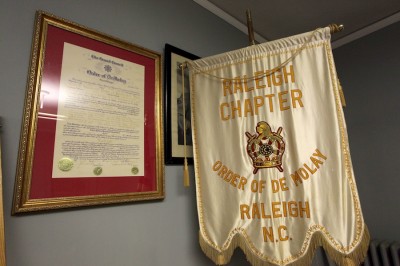
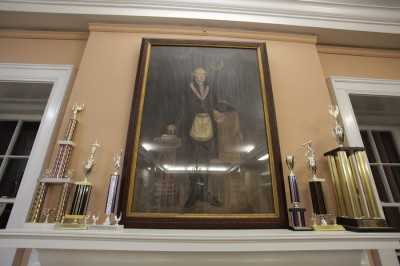
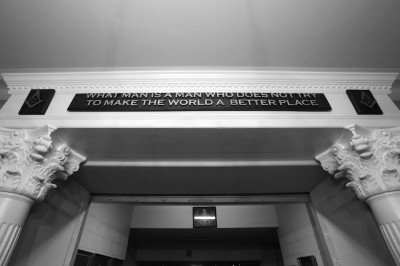
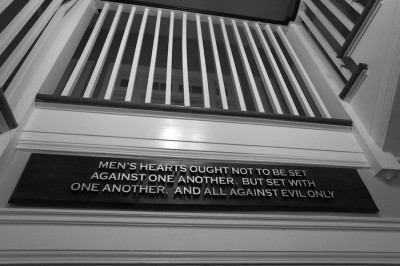

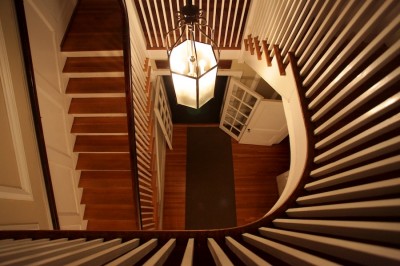
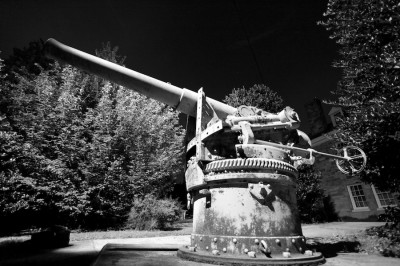
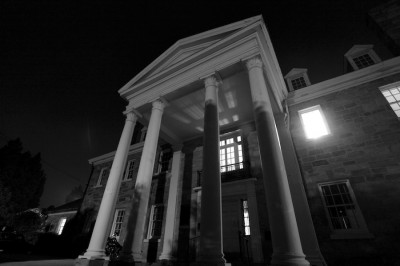
 Sign up for the Newsletter
Sign up for the Newsletter
06/17/2010
Once again, another great story about a building I’ve passed thousands of time and have always wanted to get inside. Ol’ Josephus D. was quite an character.
I did a quick search on the Wake County Property Tax website, and there’s no indication that the Federal Government owns any land anywhere in the area.
Thanks for posting this and the great pictures of the interior!
06/17/2010
If you want a tour, simply visit and ask for one.
There is usually someone there Mon-Fri.
06/17/2010
Fascinating story, John Morris — and beautifully photographed, as always.
Goodnight Raleigh readers may be interested to know that in addition to the Cap Square and RCM cannons referenced in the cited link, yet another two Raleigh cannons once stood on the NC State campus.
Spanish American War naval cannon
http://historicalstate.lib.ncsu.edu/catalog/ua023_031-007-cb0004-038-001
WW I field artillery
http://historicalstate.lib.ncsu.edu/catalog/0004736
Both were salvaged for scrap during WW II, and are now long gone.
06/19/2010
I mean this seriously — would it be possible to have the gun repositioned so the barrel is pointing to the ground? That might convey a more peaceful character (and ease the minds of those across the street!). I’m sure the barrel has been stuck that way a long time, and shifting it would be no easy task.
On the other hand, I’m not sure it is as inappropriate as the article suggests – as Masons as well as Americans, of course we prefer peace, but should always be on our guard against those who would take our liberty — a theme noted in degrees of the dependent bodies.
Scripture (Nehemiah 4:17) tells us of the rebuilding of Jerusalem: “They which builded on the wall, and they that bare burdens, with those that laded, every one with one of his hands wrought in the work, and with the other hand held a weapon.” ( The historian Josephus, appropriately, also tells us this.) A weapon, not of aggression, but of defence. Perhaps with this understanding, a cannon in front of the temple is singularly appropriate, after all.
07/01/2010
Thanks for the local history lesson, as always! I love taking a few minutes to read through posts like this :-)
01/17/2011
Although it may be just a joke, it is said that the cannon is pointed where is because the Honorable Jesse Helms lived directly across the street. Of course you know The Honorable Mr. Daniels was a staunch democrat and The Honorable Mr. Helms was a staunch rebublican.
12/20/2012
What an in treating pice of info. Being a32 degree mason I hope to see this one day. So mote it be,amen.
12/23/2018
Great article! I hope you still run this website and will see this message. I am very curious as to when the phrase, “what man is a man if he does not try to make a better place”, was put up. I am trying to figure out if it was lifted from the kingdom of heaven movie or if it predates its, so i can find the original source. Did anyone mention it during your visit there or is it a masonic phrase I have never heard of? Kind regards from the Netherlands
11/01/2022
This makes me so sad. I wanted to see what was in that building so badly. I never got to go in and I wish I had just taken the chance to ask someone. If anybody knows of a video or more photos inside this place, please please tell me.